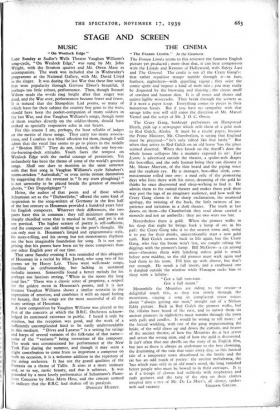THE CINEMA
" The Frozen Limits." At the Gaumont.
The Frozen Limits seems to this reviewer the funniest English picture yet produced ; more than that, it can bear comparison with the Lloyds and Keatons of Hollywood, with Safety Last and The General. The credit is not al the Crazy Gang's: that rather repulsive troupe tumble through it—in furs, feathers, nightshirts—with appalling vigour ; they seize the comic spirit and impose a kind of mob rule ; you may easily be disgusted by the browsing and sluicing ; the circus smell of sawdust and human skin. It is all noses and shouts and unintejigible wisecracks. They break through the scenery as if it were a paper hoop. Everything comes to pieces in their boisterous hands. But if you have no sympathy with that savage tribe you will still enjoy the direction of Mr. Marcel Varnel and the script of Mr. J. 0. C. Orton.
The Crazy Gang, bankrupt performers on Hampstead Heath, pick up a newspaper which tells them of a gold rush to Red Gulch, Alaska. It must be a recent paper, because the Prime Minister, Mr. Chamberlain, is saying that England must be prepared—" he's only talked like that lately." But when they arrive in Red Gulch on an old horse 'bus the place seemed deserted. When they knock on the sheriff's door the whole house collapses like a mummy exposed to air : East Lynne is advertised outside the theatre, a spider-web drapes the box-office, and the only human being they can disinter is Mr. Moore Marriott, of the thin beard and the piping voice and the exultant eye. He is manager, box-office clerk, corn- missionnaire rolled into one: a mad relic of the pioneering days who lives there with his niece, dreaming of the gold he thinks he once discovered and sleep-walking to find it. He admits them to the ruined theatre and makes them pick their way past the legs of an imaginary audience, and how well the Crazy Gang clown it : the sharp exclamation, the muttered apology, the twisting of the back, the little twitters of im- patience and irritation in a dark theatre. The truth at last dawns on them—the Chamberlain they read about carried a monocle and not an umbrella : they are two wars too late.
Nevertheless there is gold. When the pioneer walks in his sleep that night he brings back a lump of ore in his pail: the Crazy Gang take it to the nearest town and, using it to pay for their drinks, unintentionally start a new gold rush. Red Gulch swarms back to life again, but the Crazy Gang, who fear the boom won't last, are caught salting the diggings with the pioneer's lump. Bill McGrew—a cat among mice—threatens them with lynching unless gold is struck before next midday, so the old pioneer must walk again and lead them to his seam. Fill him up with cheese, but that's not enough. He needs a full moon, and a cardboard one is dangled outside the window while Flanagan rocks him to sleep with a lullaby :
." Got a full turn-turn.
Got a full moon."
Meanwhile the Mounties are riding to the rescue—a delightful touch this, as they trot slowly through the mountains, singing a song in comp:acent tenor voices about " always getting our man," straight out of a Nelson Eddy picture. Back in Red Gulch the pioneer walks, but the villains have heard of the ruse, and to outwit them six ancient pioneers in nightshirts must wander through the town with pails and candles. It would be wrong to tell more: of the forced wedding, with one of the gang impersonating the bride, of the wild chase up and down the curtains and beams of the ancient theatre, of how the Mounties do at last arrive and arrest the wrong man, and of how the gold is discovered. It isn't often that one dwells on the story of an English film, but just as there is always an undertone to the best clowning, the drumming of the rain that rains every day, so this farcical tale of a temporary town abandoned to the beetle and the rat has an odd touch of poetry: the ancient melodrama, the 'bus which runs only in an old man's mind, the long vanished better people who must be bowed to in their carriages. It is as if a troupe of clowns had suddenly with raspberries and rude gestures and the tang of the ring on their clothes irrupted into a tare of Mr. De La Mare's, all silence, spider-




































































 Previous page
Previous page